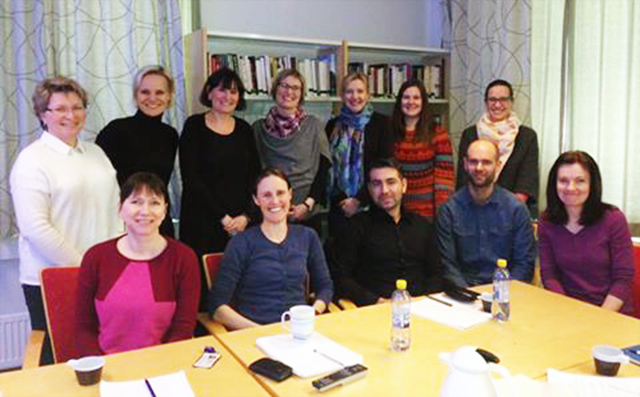Case Study: Defending your Thesis
Your doctoral defense is like a freight train: There’s no stopping it, and the train seems to speed up the closer you get to the defense. Which makes it all the more important to prepare well for when it’s your turn!

The aim was to critically analyze the PhD defense of Tricia Larose, who defended her thesis “Vitamin D status in a Norwegian population: any link to lung function?” on April 10. Together with Professor of Biostatistics Eva Skovlund, Tricia had made a short questionnaire with open-ended questions. The PhD students who attended Tricia’s defense filled out the questionnaire, and two weeks later, we all went through the answers together. It was a very interesting and useful discussion, and hopefully this is something we’ll do again in the future - if we find another PhD student who’s brave enough to follow in Tricia’s footsteps!
Report from Tricia
Purpose: To give fellow PhD candidates the opportunity to use a "live" disputas as an epidemiologic case study with the help of a senior faculty member. Candidate: Tricia Larose, institutt for samfunnsmedisin, NTNU Co-Facilitator: Professor of Biostatistics, Eva Skovlund, NTNU
Steps followed:
- Broadcast email to all ISM stipendiat with invitation
- Create and distribute anonymous feeback form
- PhD Candidates attended the disputas and trial lecture and completed the anonymous form (anonymity is important, that way everyone felt comfortable asking difficult questions)
- Following the disputas, the stipendiat took all anonymous feedback forms, compiled and categorized questions for workshop
- 2 weeks after the disputas, fellow PhD candidates attended a semi-structured 2 hour workshop with the candidate and co-facilitator where all questions provided via anonymous feedback forms were discussed in an open format with all present
- It is most beneficial for stipendiater to attend both the disputas and the workshop, but each individual was more than welcome to attend the disputas, or workshop, or both.
- All information including anonymous feedback forms, and the questions to be discussed were emailed out to the group
- I also sent out a copy of all the forms I submitted with my PhD because this information was in several different places and was not always correct
- Finally, it was very important to have a volunteer administrator to help with this process. This burden cannot fall on the stipendiat or the co-facilitator. For this role, we had a fellow stipendiat (Silje Kaspersen)
Numbers in attendance: Approximately 20 PhD candidates expressed their interest in attending the disputas and workshop. Approximately 15 attended the disputas, some of whom did not attend the workshop. Approximately 15 attended the workshop, some of who did not attend the disputas. THANK YOU EPINOR FOR SPONSORING OUR WORKSHOP LUNCH!!!!
Feeback from two participants
Participant 1: "This is probably the most relevant workshop I’m going to participate in during my whole PhD-period. An unique opportunity to ask all the silly (and not so silly) questions about how to prepare for the trial lecture/defense, what to expect from the opponents, typical “epidemiological” questions that will be asked etc. When my D-day (disputas) is near, the notes and reflections from this workshop will be essential."
Participant 2: "This is the first time we've tried having a structured evaluation of a doctoral defense here at ISM, NTNU. First of all, it's made me aware that regardless of whether or not there's an evaluation afterwards, I have to listen more attentively and take good notes when I attend a doctoral defense. Quite a few questions regarding epidemiology and methods are similar for many projects, and by being prepared for them, you're more likely to answer these questions well when it's your turn to defend your thesis. Discussing Tricia's defense was particularly useful for me because we both use data from HUNT, but even if I hadn't, I still would've learned a lot, both from giving structured feedback and from the discussion afterwards.
I really appreciated that we had a professor present when we went through the four open-ended questions we had answered during the defense, but if necessary, I think it would work without a senior researcher as well. It gave us a chance to discuss questions or answers we thought were unclear, and we didn't necessarily agree with everything the opponents had said. In addition to epidemiology, we also got some very practical advice, both on the process before the defense and big day itself. Which forms do you have to fill out? Where do you sign? Who do you invite for dinner? It can seem quite overwhelming at times. A structured evaluation of a PhD defense gives PhD students a chance to learn and prepare for their own defense. For the PhD student who agrees to become the "case study", I imagine it must work like a debriefing, as well as a chance to pass on valuable knowledge. I hope we'll be able to do this again in the future. I would like to thank Tricia for initiating the evaluation, and Eva for enthusiastically agreeing to participate, and I would definitely recommend that PhD students at other universities try this as well."
Last updated: 21.03.2017 08:57
Attachments:
| EpiDisputasCaseStudyForm |